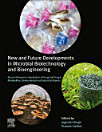Microbial Resource Technologies for Sustainable Development
About this ebook
About the author
Prof. Joginder Singh is a Professor at the Department of Botany, Nagaland University, Lumami, Nagaland, India. Previously, he worked as a Professor in the School of Bioengineering and Biosciences, Lovely Professional University and also as a Young Scientist at Microbial Biotechnology and Biofertilizer Laboratory, Department of Botany, Jai Narain Vyas University on a research project funded by the Department of Science and Technology, Government of India. He is an active member of various scientific societies and organizations, including the Association of Microbiologists of India, the Indian Society of Salinity Research Scientists, the Indian Society for Radiation Biology, and the European Federation of Biotechnology. He has published extensively with Elsevier and Springer both in journals and books. He serves as a reviewer for many prestigious journals, including Current Research in Engineering, Science and Technology; Journal of Cleaner Production; Science of the Total Environment; Environmental Monitoring and Assessment; Pedosphere; Soil and Sediment Contamination; Symbiosis; International Journal of Phytoremediation; Ecotoxicology and Environmental Safety; Annals of Agricultural Sciences; and Annals of the Brazilian Academy of Sciences.
Dr. Deepansh Sharma is presently working as assistant professor at the Amity Institute of Microbial Technology, Amity University, Rajasthan, India. He joined the world of academia in 2015 at Lovely Professional University, Phagwara, India, after receiving his doctoral degree in microbiology with a specialization in biosurfactants research. He is M. Phil (Microbiology) from CCS University, Meerut, and M.Sc. (Microbiology) from Gurukula Kangri University, Haridwar, India, with ICAR-ASRB-NET. He has over eight years of research and teaching experience. He has successfully completed several recent food fermentation industrial consultancy projects. Dr. Sharma is a recipient of the DAAD (Germany) short-term fellowship for doctoral studies in Karlsruhe Institute of Technology, Karlsruhe, Germany. Dr. Sharma has published over 25 research papers and reviews in national and international journals and consortium proceedings along with 5 book chapters on various aspects of the microbial world. He is author of Biosurfactants of Lactic Acid Bacteria and Biosurfactants in Food (2016) published by Springer International Publishing. His research interests include biosurfactants, bacteriocins, and microbial food additives.







